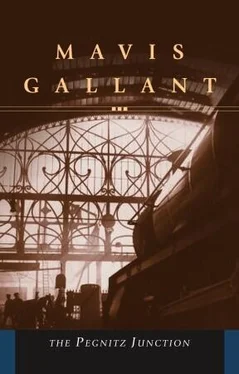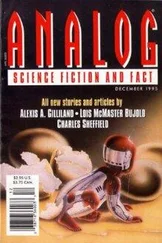When we were face to face, Peter and I said together, “What are you doing here?”
“I live here — I teach,” I said.
“No!” Turning to his wife, he said excitedly, “You know who this is, don’t you? It’s Erika.” Then, back to me, “We’ve come up to see my wife’s twins. They’re in a summer school here.”
“Better than dragging them round with us,” said his wife, in a low-pitched, foggy voice. “They’re better off in the fresh air.” She touched my arm as if she had always known me and said, “I just can’t believe I’ve finally seen you. Poodlie, it’s like a dream .”
I was faced with two pandas — those glasses! Who was Poodlie? Peter, evidently, yet he called her “Poodlie,” too: “Poodlie, it’s wonderful,” he said, as if she were denying it. His wife? Her voice was twenty years older than his.
He went off to see to their luggage and she stopped seeing me, abruptly, as if now that he was gone nothing was needed. She looked at the village — as much as she could see, which was the central street and the station and the shutters of the station buffet. All I could see was her mouth and the tight pinpoint muscles around it, and the flour dusting of face powder.
“Well?” she said when Peter returned.
“I can’t believe it,” he said to me, and laughed. “Here! What are you doing here ?”
“I teach,” I began again.
“No, here at the station, now, on Sunday.”
“Oh, that. I was waiting for the train with the Sunday papers.”
“I told you,” he cried to his wife. “Remember it was one of the things I said. Even if Erika was starving, she’d buy newspapers. I never knew anyone to read so many papers.”
“I haven’t had to choose between starving and reading,” I said, which was a lie. I watched with regret the bale of papers carted off to the kiosk. In half an hour, those I wanted would be gone.
“ We’re starving,” he said. “You’ll have lunch with us, won’t you? Now?”
“It’s early,” I said, glancing at his wife.
“Call it breakfast, then.” He began guiding us both towards the buffet, his arms around our shoulders in a peasant-like bonhomie that was not like anything I remembered of him.
“The luggage, Poodlie,” said his wife.
“He’ll take it to the hotel.”
“What hotel?”
“The biggest.”
“Then it’s there,” I said, and pointed to an Alpine fortified castle, circa 1912, of yellowish stone, propped behind the street as if on a ledge.
“Good,” he said. “Now our lunch.”
That was how, on a cool bright day, just before the start of term, I saw Peter again.
In the dark buffet, Peter and his wife kept their glasses on. It seemed part of their personal decorum. Although the clock had only just struck twelve, the restaurant was nearly filled, and we were given a table between the serving pantry and the door. I understood that this was Peter, even though he didn’t look at all like the man I had known, and that I was sharing his table. I avoided looking at him. Across the room, over an ocean of heads, was an open window, geraniums, the mountains, and the sky.
“You have beautiful eyes,” said Peter’s wife. Her voice, like a ventriloquist’s, seemed to come from the wrong place — from behind her sunglasses. “Poodlie never told me that. They look like topazes or something like that.”
“Yes,” said Peter. “Semiprecious stones from the snow-capped mountains of South America.”
He sounded like a pompous old man. His English was smooth as cream now, and better than mine. I spoke it with too many people who had accents. Answering a question of his wife’s, I heard myself making something thick and endless out of the letter “t”: “It is crowded because it is Sunday. Tourists come for miles around. The food in the buffet is celebrated.”
“We’ll see,” said Peter, and took the long plastic-covered menu with rather an air.
His wife was attentive to me. Parents of pupils always try to make me eat more than I care to, perhaps thinking that I would be less intractable if I were less thin. “Your daughter is not only a genius but will make a brilliant marriage,” I am supposed to say over caramel cake. I let myself be coaxed by Peter’s wife into having a speciality of the place — something monstrous, with boiled meat and dumplings that swam in broth. Having arranged this, she settled down to her tea and toast. As for Peter — well, what a performance! First he read the whole menu aloud and grimaced at everything; then he asked for a raw onion and a bunch of radishes and two pots of yoghurt, and cut up the onions and radishes in the yoghurt and ate the whole mess with a spoon. It was like the frantic exhibition of a child who has been made uneasy.
“He isn’t well,” said his wife, quite as though he weren’t there. “He treats it like a joke, but you know, he was in jail after the Budapest uprising, and he was so badly treated that it ruined his stomach. He’ll never be the same again.”
He did not look up or kick me under the table or in any manner ask me not to betray him. It occurred to me he had forgotten I knew. I felt my face flushing, as if I had been boiled in the same water as the beef and dumplings. I thought I would choke. I looked, this time with real longing, at the mountain peaks. They seem so near in the clear weather that sometimes innocent foot travellers set off thinking they will be there in three-quarters of an hour. The pockets of snow looked as if they could have been scooped up with a coffee spoon. The cows on the lower slopes were the size of thimbles.
“Do you ski at this time of year?” said Peter’s wife, without turning to see what I was staring at.
“One can, but I don’t go up any more. There’s an hour-and-a-half walk to the middle station, and the road isn’t pleasant. It’s all slush and mud.” I thought they would ask what “the middle station” meant, but they didn’t, which meant they weren’t really listening.
When I refused a pudding, Peter said, with his old teasing, “I told you she was frugal. Her father was a German professor at Debrecen, the Protestant university.”
“So was yours,” said his wife sharply, as though reminding him of a truth he forgot from time to time.
“It never affected me,” said Peter, smiling.
“That’s where you met, then,” said his wife, taking her eyes from me at last.
“No,” said Peter. “We were only children then. We met when we were grown up, at the University of Lausanne. It was a coincidence, like meeting today. Erika and I will probably meet — I don’t know where. On the moon.”
It is difficult enough to listen to someone lying without looking shocked, but imagine what it might be to be part of the fantasy; his lies were a whirlwind, and I was at the core, trying to recognize something familiar. We met in Lausanne; that was true. We met on a bench in the public gardens. I told him I had lived in Hungary and could speak a few sentences of Hungarian still. He was four years younger than I. I told him about my father in Debrecen, and that we were Germans, and that my father had been shot by a Russian soldier. I said I was grateful for Switzerland. He told me he was a half Jew from Budapest and had been ill-used. His life had been saved in some remarkable way by a neutral embassy. He was grateful, too.
He was the first person to whom I had ever spoken spontaneously and without reserve. We met every day for ten days, and when he wanted to leave Switzerland because he thought it would be better somewhere else and would not go without me, I did not think twice. The evening lamps went on in the park where we were sitting, and I thought that if I did not go with him I would suffer every evening for the rest of my life, every time the lamps were lit. To avoid suffering, I went with him. Yet when I told my father’s old friends, the people who had taken me in and welcomed me and kept me from starving, I said it was my duty. I said it was Peter who could not live without me. It is true I would never have gone out of Switzerland, out to the wilderness, but for him. My father had friends at the University of Lausanne, and although after the war some were afraid, because the wind had shifted, others took me in when I was seventeen and homeless and looked after me until I could work. I was afraid of telling about Peter. In the end, I had to. I quoted something my father had once said about duty, and no one could contradict that.
Читать дальше












